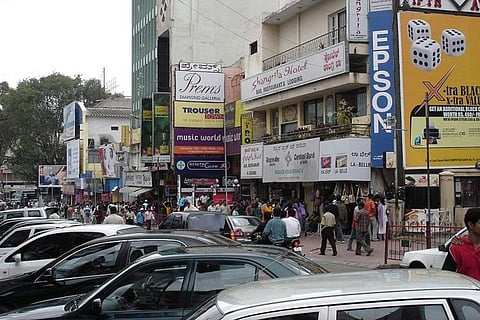

Roadside parking in Bengaluru is set to get costlier as the Karnataka government has approved a new parking policy for the city. The Karnataka Urban Development Department has accepted the draft policy framed by the Directorate of Urban Land Transport (DULT) that aims at decongesting and doing away with haphazard parking on Bengaluru’s roads, and to ease up road space for the seamless movement of people and vehicles.
The Parking Policy 2.0 aims at minimising roadside parking, and to ensure the same, the policy has said that users be charged the cost of parking and to make users directly pay for their desired parking convenience. Urban local bodies will be asked to consider parking management as one of its key functions and deliver parking services in a systematic and efficient manner. The policy recommends that on-street commercial parking be 1.5 to 3 times the base parking fee, depending on location. On-street parking fee beyond one hour should be increased for busy commercial areas, the policy says.
DULT’s policy seeks to adopt a permit system for alloting designated parking zones near the homes of residents on a pilot basis. The pay-and-park system will be implemented in a few areas of the city initially. The area-wise plans will be prepared by DULT and the Bruhat Bengaluru Mahanagara Palike (BBMP) this year.
Residents will be able to purchase parking permits on a quarterly or annual basis and then renew them upon expiry. “However, a permit does not guarantee a parking spot but only authorizes the permit holder to park on the road for which the permit is allotted, if space is available,” the policy document states.
The annual parking permit for small cars will be Rs 1000 while the parking permit for medium cars will be Rs 3,000 or Rs 4,000. The parking permit for larger vehicles like SUVs will be Rs 5000. No charges will be levied for parking of bicycles in designated areas.
The policy in a nutshell as far as parking near homes is concerned
The parking policy also covers shared mobility operators and delivery agents who can pay bulk parking fees. “Such beneficiaries shall be validated by the aggregator and RTO. A database of such beneficiaries should be maintained in the central parking portal,” the policy document reads.
Regular users of off-street parking can also apply for a monthly parking pass. The policy also aims to decongest Bengaluru roads and place curbs on-street parking especially in areas with a multi-level parking facility.
It also plans to use existing CCTV cameras in the city to monitor and enforce parking regulations and also discusses using local volunteers and conducting a parking census every year to help with the effort.
In other measures suggested, the policy contends that the traffic congestion at the centre of Bengaluru is linked to the movement of freight vehicles and the location of major wholesale markets in the city. It suggests shifting a few wholesale markets to the periphery of the city.
“Any measure to place a price on an item that was previously free is likely to be met with resistance. The case of on-street parking in residential areas is also no different and requires widespread citizen participation to build a slow yet steady movement towards reclaiming residential street space from parking,“ it states.
The parking policy also aims to encourage residents in Bengaluru to take to public transport. “The broader objective of utilization of the parking revenue should be to reduce the demand for parking by improving other sustainable mobility options like footpaths and public realm for improved conditions for walking, safe cycling infrastructure, integrated public transport network, etc. Thereby, over time, the need to commute by private vehicles would reduce and land allocated for parking can be reclaimed and put for more productive use,” it adds.
The DULT’s policy was drafted over the past two years and had invited public opinion as well. The policy was made public in March 2020, and focused on a four-point goal: making a shift from chaotic parking to organized parking in the city; from free parking to paid parking; move from government-driven parking supply to market-driven parking supply; and management and ensure strict enforcement of the new policy – a shift from the present “passive and weak” enforcement.